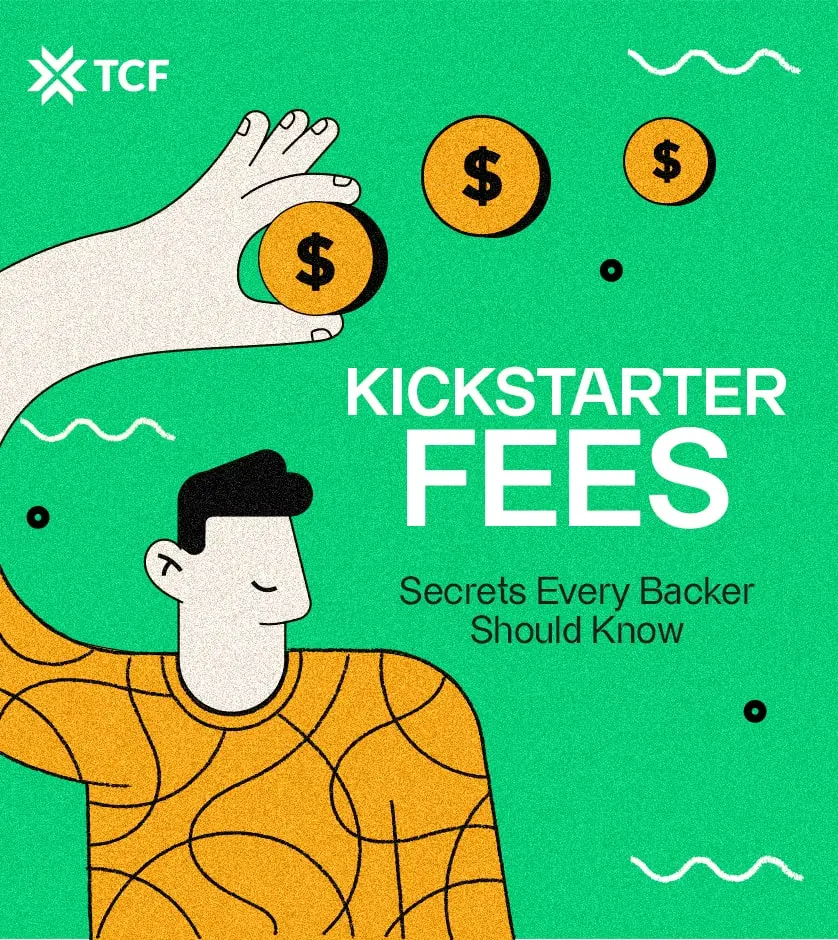Thinking about launching a Kickstarter campaign but unsure how much it’ll cost you? Here’s a fun fact: If your campaign doesn’t meet its goal, you pay absolutely nothing in fees. Yep, zero, zilch, nada. But if your project does succeed (which we’re rooting for), there are a few essential costs you’ll need to plan for—and they’re not as scary as you might think.
Kickstarter’s fee structure is one of the most straightforward in the crowdfunding world, but there’s still a bit to unpack. From platform fees to payment processing charges and even hidden expenses like reward fulfillment and taxes, it’s important to understand how much you’ll actually take home once the confetti settles.
In this guide, we’ll break down every fee you need to know—and yes, we’ll also reveal those sneaky extra costs creators sometimes overlook. By the end, you’ll have a crystal-clear picture of Kickstarter’s fee structure so you can set a funding goal that’s actually realistic (no one wants to be stuck shipping rewards at a loss).
Here’s what you’ll learn:
- The core Kickstarter fees (and how to calculate them).
- Sneaky costs creators forget (like shipping and taxes!).
- How to manage dropped and refunded pledges.
- The Kickstarter payout process and when to expect your funds.
So, ready to tackle Kickstarter fees like a pro? Let’s get into it.
Unlock
the Full Potential of Your Kickstarter Campaign
What Are Kickstarter Fees?
Before we dive into the nitty-gritty details, let’s start with the basics. Kickstarter fees are the costs associated with using the platform to crowdfund your project. While the idea of fees might make you sweat, the good news is that Kickstarter’s fee structure is transparent and easy to understand.
Here’s the key thing to remember: Kickstarter only charges fees if your campaign is successful. If you’re just testing the waters or your campaign doesn’t hit its goal, you’re off the hook. But once you’re funded, Kickstarter collects a percentage of the total amount you raise, along with payment processing fees.
These fees are unavoidable and should be baked into your campaign’s financial plan. But wait—there’s more. Hidden costs, like taxes and reward fulfillment expenses, can sneak up on you if you’re not prepared.
We’ll walk you through all of it step-by-step so you can budget for success and avoid any unpleasant surprises.
Types of Kickstarter Fees
Now that you know the basics, it’s time to take a closer look at the specific types of fees you’ll encounter as a creator. Kickstarter fees fall into a few distinct categories, each playing a role in how much of your funding you actually get to keep.
Platform Fees
Kickstarter’s platform fee is the most well-known cost creators face. This is a flat 5% fee charged on the total amount you raise. If you raise $10,000, for example, Kickstarter takes $500 right off the top. This fee helps maintain Kickstarter’s platform, keep the site running, and support customer service.
What to Remember:
- This fee is non-negotiable and applies to all campaigns that meet their funding goals.
- It’s deducted before funds are paid out to you, so you won’t have to worry about paying it manually.
Payment Processing Fees
Each backer’s payment needs to be processed, and that’s where payment processing fees come in. Kickstarter partners with payment processors like Stripe to handle these transactions.
How It’s Calculated:
- For pledges over $10, you’ll be charged 3% + $0.20 per transaction.
- For smaller pledges under $10, a fee of 5% + $0.05 per transaction is charged instead.
What to Remember:
- Payment processing fees vary by country, so if you’re outside the U.S., expect slight differences.
- These fees apply to every backer’s pledge, meaning multiple small pledges can increase the fees you’ll pay overall.
Extra Costs
While the platform and payment processing fees are well-known, there are a few other costs that can catch creators off guard. These extra costs can significantly impact your campaign’s profitability if not properly accounted for.
Taxes
Depending on where you’re based, you may need to pay taxes on the funds you raise. In most cases, the funds you raise are considered taxable income. This can vary depending on your local laws and the nature of your project.
What to Remember:
- Income Tax: In many countries, the funds you raise through Kickstarter are considered business income and are subject to local income tax laws. Consult with a tax professional to determine how much you’ll owe.
- Sales Tax or VAT: If you’re shipping physical products as backer rewards, you may be required to charge and remit sales tax or VAT. This is especially true for creators shipping to backers in the EU, where VAT regulations are strict.
- Documentation: Keep detailed records of your project’s finances, as you’ll need to report this information when you file your taxes.
- Professional Help: Because tax laws vary by country (and even by state in the U.S.), it’s a good idea to work with an accountant or tax professional to avoid costly mistakes.
Pro Tip: Taxes aren’t just Kickstarter’s problem—they’re your problem. If you’re unfamiliar with how taxes apply to your project, get professional guidance early to avoid surprises during tax season.
Reward Fulfillment Costs
While not an official Kickstarter fee, the costs of producing and shipping backer rewards can add up quickly. From packaging and shipping to manufacturing and production, these costs come straight out of your raised funds.
What to Remember:
- Shipping fees can be tricky, especially for international backers. Plan for extra costs.
- Calculate your production costs for rewards, as these vary depending on what you’re creating.
- It’s wise to overestimate these costs to avoid being caught off guard.
Reward fulfillment costs are often overlooked by new creators, but they’re one of the most important costs to plan for. Since these costs are directly tied to your backer’s experience, underestimating them can hurt your project’s reputation and profitability. Be sure to factor these costs into your funding goal from the start.
Kickstarter Shipping Costs
Shipping can be one of the most unpredictable costs in a Kickstarter campaign. While not a formal fee charged by Kickstarter, it’s a cost that creators must plan for when fulfilling backer rewards.
What to Remember:
- Domestic vs. International Shipping: Shipping internationally can be significantly more expensive due to customs fees, VAT, and additional carrier charges.
- Weight and Size Matter: The larger and heavier your product, the more it will cost to ship.
- Customs and Duties: For international shipping, be aware of customs fees and taxes that may be charged to your backers.
- Carrier Rates: Compare rates from multiple carriers (like USPS, FedEx, and DHL) to find the best option.
Proper planning for shipping costs will save you from losing profits or, worse, going into debt to cover the costs.
Managing Failed and Dropped Pledges
Sometimes, backers cancel their pledges before the campaign ends, or their payments fail to process. These “dropped” pledges can affect your final funding total and your ability to deliver rewards.
What to Remember:
- Backer Cancellations: Backers can cancel their pledge at any time before the campaign ends. This can affect your overall funding goal and make it harder to hit your target.
- Failed Payments: After the campaign ends, some backer payments might fail due to expired credit cards, insufficient funds, or other issues. Kickstarter provides a grace period for backers to resolve payment issues.
How to Minimize It:
- Send Reminders: Before the deadline, remind backers to update payment info via campaign updates and messages to reduce failed payments.
- Plan for Losses: Account for a 3-5% drop in pledges by adjusting your funding goal to cover potential shortfalls.
- Follow Up: After the campaign, message backers with failed payments to encourage updates and recover dropped pledges.
Dealing with Cancelled and Refunded Pledges
Cancelled and refunded pledges can significantly impact your total funds and fulfillment plans. Understanding why they happen and how to handle them is key to maintaining project stability and avoiding disruptions in production or delivery timelines.
Why It Happens:
- Backer Cancellations: Backers may change their minds or encounter personal financial issues, causing them to cancel before the campaign ends. Sometimes, they may also be influenced by delays, a lack of updates, or negative feedback from other backers.
- Refund Requests: After the campaign, backers might request refunds due to shipping delays, unmet product expectations, or dissatisfaction with reward quality. Delays in production or shipping can trigger more refund requests, especially if backers feel left in the dark.
How to Handle It:
- Communicate Early and Often: Keep backers informed of production progress, shipping timelines, and any changes. Consistent updates reduce refund requests by maintaining backer trust and confidence. Share visuals or videos of production to reassure backers that progress is being made.
- Set a Clear Refund Policy: Establish a transparent refund policy before launching your campaign to manage backer expectations. Be clear about what qualifies for a refund and under what conditions. Clearly state this policy on your campaign page so backers know what to expect.
- Address Issues Promptly: Respond quickly to refund requests and offer solutions like replacements, partial refunds, or exclusive perks to retain backer trust. Fast responses demonstrate professionalism and prevent negative reviews that could affect future campaigns.
- Track Cancellation Trends: Monitor reasons for cancellations and refund requests. If you notice patterns (like delays causing more refund requests), address the root cause early. Proactive changes can reduce the number of cancellations and help you maintain funding stability.
- Plan for Refund Reserves: Build a small buffer into your funding goal to accommodate refunds. If 2-5% of backers request refunds, having reserve funds can prevent cash flow issues and ensure smooth fulfillment.
Kickstarter Payout Process: When to Expect Your Funds
Once your Kickstarter campaign successfully ends, you’re probably eager to access the funds and get started on production. But the payout process isn’t instant. Understanding how and when Kickstarter releases funds can help you plan for manufacturing, shipping, and other key expenses.
How Long Does It Take?
- 14-Day Processing Period: Once your campaign ends, Kickstarter takes up to 14 days to process payments from backers. This period allows Kickstarter to address failed payments and provide backers a chance to update their payment information.
- Payment Transfer to Bank: After the 14-day processing period, Kickstarter transfers your funds to the bank account you linked during your campaign setup. Depending on your bank, this transfer can take 3-5 additional business days to reflect in your account.
What Can Delay Your Payout?
- Failed Payments: If a large number of backers have payment issues, Kickstarter may need more time to process final payments.
- Bank Verification Issues: If your bank details are incorrect or if there’s an issue with your bank’s processing times, transfers could be delayed.
- Holidays and Weekends: Payments won’t be processed on weekends or bank holidays, so expect delays if your payout date falls near one of these days.
How to Ensure a Smooth Payout:
- Double-Check Bank Info: Make sure your bank account details are accurate before the campaign ends.
- Communicate with Backers: Encourage backers to update payment details before the campaign closes to avoid failed payments.
- Plan for Delays: Assume it may take up to 3 weeks from the campaign end date to receive your funds, and plan your production and shipping schedules accordingly.
By understanding the Kickstarter payout process, you can set realistic production timelines and avoid delays. With payments spread across a 14-day processing window and additional time for bank transfers, it’s best to prepare for a total of 21 days before accessing your funds.
Make Your Project The Next 7-Digit Crowdfunding Campaign
Conclusion
Kickstarter fees might seem overwhelming at first, but with a solid understanding of how they work, you can budget smarter and set a more realistic funding goal. From platform fees and payment processing to extra costs like taxes and reward fulfillment, each expense plays a role in how much you’ll actually take home.
To avoid unpleasant surprises, plan for delays in payouts, anticipate dropped pledges, and set aside funds for potential refunds. By being proactive, you’ll keep your backers happy and your campaign on track.
Whether you’re gearing up for your first campaign or refining your approach for the next launches, knowing the ins and outs of Kickstarter fees puts you in control. With this knowledge in hand, you’re ready to run a successful campaign and achieve your creative goals.
Launch, next question!
FAQ
What do Kickstarter backers get in return?
Backers receive rewards or perks from campaign creators. These are often exclusive products, discounts, or unique experiences related to the project. Higher pledge amounts typically unlock more valuable or limited-edition rewards.
Campaign creators determine the type of rewards and their availability at different pledge levels. To see the rewards available for a specific project, check the project’s campaign page.
How does Kickstarter pay out?
Kickstarter operates on an all-or-nothing funding model, meaning you only receive funds if your campaign meets or exceeds its funding goal by the deadline. If you’re even $1 short of your goal, no funds are collected, and backers aren’t charged.
After the campaign ends, Kickstarter takes up to 14 days to process payments from backers. If a payment fails (due to an expired card, for example), Kickstarter gives backers time to update their payment details.
Once payments are processed, Kickstarter deducts its 5% platform fee and payment processing fees (3% + $0.20 per pledge). The remaining balance is transferred to the creator’s linked bank account, which can take an additional 3-5 business days to arrive, depending on the bank.
Do you have to pay back backers on Kickstarter?
On Kickstarter, you don’t “pay back” your backers in the traditional sense. If your project doesn’t meet its funding goal, backers aren’t charged, and you don’t owe them anything.
If your project meets its goal, your responsibility is to fulfill the promised rewards. Backers pledge money in exchange for these rewards, not financial returns or equity in your project.
It’s essential to have a clear plan for reward production and delivery since delays or miscommunication can lead to refund requests from backers. Unlike loans or investments, Kickstarter backers don’t receive a financial return—they’re supporting your project and receiving a reward in return.





Comments